Tag: Hospice Care
Articles about hospice care including how to manage comfort at end of life.
Articles about hospice care including how to manage comfort at end of life.
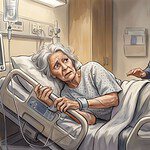
When nursing home residents with dementia face hospitalization, families often discover critical gaps in advance care planning. Studies show most dementia patients lack DNR orders, and hospice referrals remain rare despite distressing hospital experiences. Learn how proactive planning—including palliative care, hospice eligibility, and proper DNR documentation—can protect your loved one's comfort and dignity.

Hospice fraud not only harms terminally ill patients but also devastates their caregivers and families. This article explores the impacts and offers tips on choosing a reliable hospice provider.
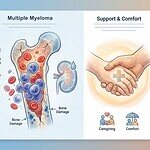
This comprehensive guide helps patients, families, and caregivers understand Multiple Myeloma diagnosis and staging, explore survival expectations, and navigate palliative and hospice care options. Discover practical caregiving strategies and when early palliative care can enhance quality of life.
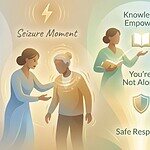
When someone you love has dementia, seizures may become part of their journey. Learn which types of dementia increase seizure risk, how to recognize and respond to seizures safely, when to call for emergency help, and which medications may affect seizure risk. This compassionate guide empowers caregivers with knowledge and confidence.

Hospice providers have proven strategies to reduce symptom burden and boost satisfaction scores. Discover how combining nurse practitioner telehealth visits, educational videos, and end-of-life doula support transforms caregiver confidence and patient comfort in home-based care.

End-of-life doulas offer untapped potential as compassionate partners in healthcare. These trained professionals complement hospice care by providing extended emotional and spiritual support, serving as life transition coaches long before hospice is needed—enhancing end-of-life experiences for families.

Navigate the journey of acute myeloid leukemia with confidence. This comprehensive guide covers disease progression, comfort-focused symptom management, and practical palliative and hospice care timing advice.

A heartbreaking Facebook post reveals the devastating reality when families don't plan ahead for long-term care. Learn how Medicaid Asset Protection Trusts and working with life transition coaches years in advance can protect your home, savings, and dignity—and why the five-year lookback means you must act now.

After 15 years and 300 final breaths, nurse Laura M. discovered seven profound truths about what truly matters in life. Her patients didn't fear dying—they feared not having really lived. Learn these life-changing lessons and discover how life transition coaches can help you live with fewer regrets and ensure your wishes are honored.

End-of-life doulas provide non-medical support that transforms dying experiences through education, emotional companionship, and advocacy. Learn how these trained professionals help patients and families navigate terminal illness with dignity, how healthcare providers can partner with doulas, and what to look for when selecting one.
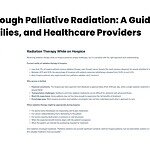
Palliative radiation therapy offers targeted symptom relief for patients with advanced cancer, reducing pain, bleeding, and other distressing symptoms. This comprehensive guide empowers patients and families to understand treatment options, manage side effects, and make informed decisions that prioritize comfort and quality of life.

Despite Medicare's six-month hospice benefit, most patients receive care for only 18-21 days, often when already transitioning to death. Research shows early hospice enrollment can extend life by 29-81 days while dramatically improving quality of life. Life transition coaches help families navigate earlier hospice and palliative care adoption for better outcomes.

A hospice nurse reflects on a powerful moment with a dying patient who painted "Three Wishes"—dandelions symbolizing childhood innocence and life's fleeting nature. This experience teaches us to examine how we're living, who we love, and what matters most. Learn why advance directives and living with fewer regrets matter for everyone.

Geri-Gadgets® are safe, sensory-rich fidget tools designed to help people with dementia, neurodiverse individuals, and anyone who benefits from fidgeting. These colorful, non-toxic products improve mood, reduce anxiety, encourage engagement, and support physical and cognitive health. Learn how these innovative tools can transform care.

Research shows private equity-owned hospice agencies spend less on direct patient care, leading to higher hospitalization rates and poorer quality. End-of-life doulas bridge these gaps by providing emotional, social, and spiritual support, vigil planning, and legacy projects that most hospice agencies don't offer.
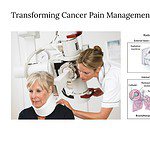
A groundbreaking clinical trial demonstrates that single-fraction radiotherapy alongside supportive care can dramatically improve pain management for liver cancer patients, with 67% reporting reduced pain intensity and potential implications for future palliative treatment strategies.

Navigating the complexities of end-of-life care can be challenging. This article delves into the nuances of terminal agitation and terminal restlessness, providing caregivers and family members with the essential knowledge to better understand and support their loved ones during the final stages of life.

Hospice care extends beyond end-of-life support, offering comprehensive services for patients with terminal illnesses. Early enrollment can provide months of valuable support, improving patient and family quality of life through specialized care and resources.

Recent University of Michigan research found that benzodiazepines and antipsychotics commonly prescribed in hospice care may significantly increase mortality risk for people with dementia. This article explores these findings and provides essential advocacy guidance for families, caregivers, and hospice professionals.
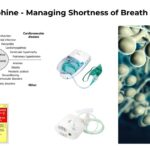
Nebulized morphine provides significant relief for patients with severe breathlessness, especially in end-stage pulmonary diseases. Learn about its application, dosage, and benefits in hospice care.
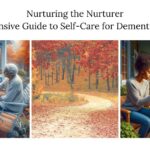
Caring for a loved one with dementia is a challenging journey that can take a toll on caregivers' physical and emotional health. This comprehensive guide offers practical strategies for dementia caregivers to prioritize self-care, manage stress, and maintain their well-being while providing compassionate care for their loved ones.

Discover essential strategies for managing diabetes in loved ones with dementia. This comprehensive guide covers blood sugar monitoring, medication administration, diet management, and recognizing emergencies, empowering caregivers to provide optimal care.

Discover the transformative role of Macy catheters in hospice and palliative care. This comprehensive guide explores how these innovative devices enhance patient comfort, simplify medication administration, and support caregivers. Learn about their benefits, proper use, and impact on the quality of life for those receiving end-of-life care.

Deciding when to involve hospice care for a loved one with dementia can be challenging. This comprehensive guide helps non-healthcare professionals recognize the signs that indicate it's time to consider hospice, understand the benefits of hospice care, and navigate the decision-making process with compassion and informed judgment.